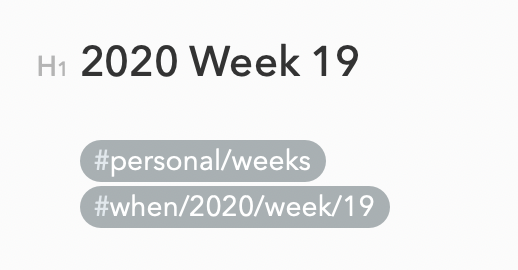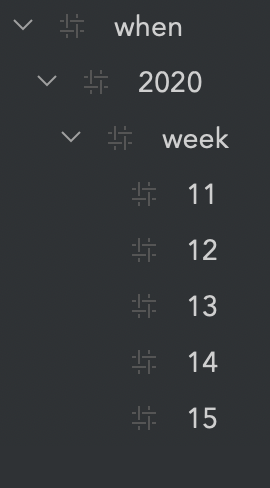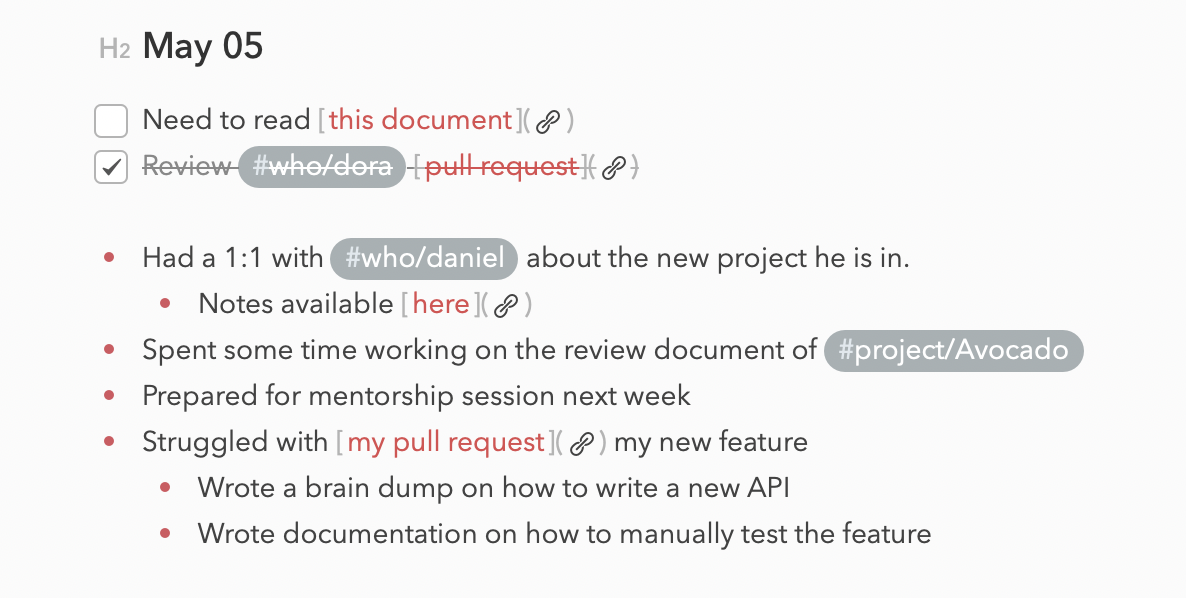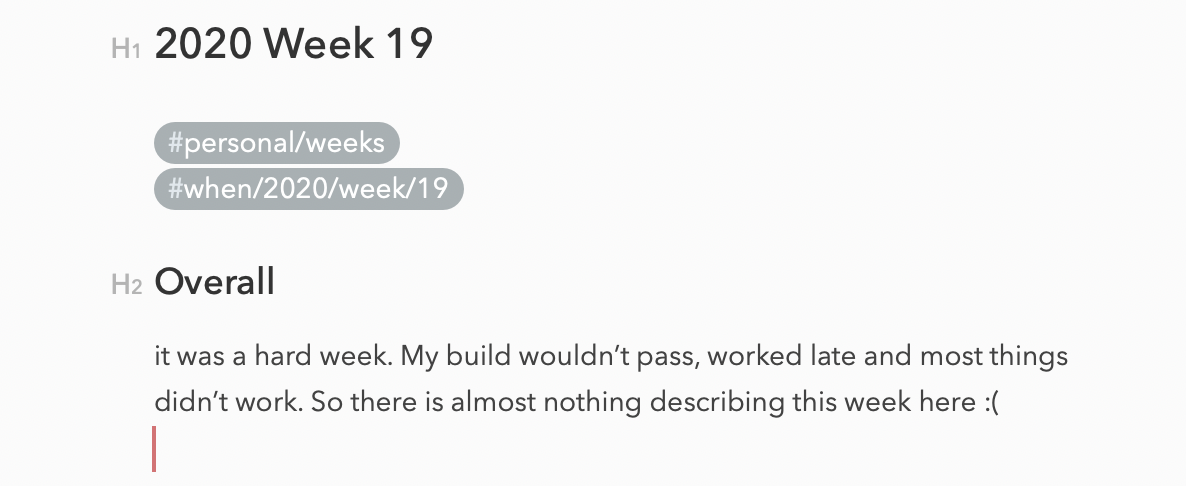How I deal with my impostor syndrome

As the years went by, I developed a framework to deal with my impostor syndrome in different scales it occurs. It is not something super complex or with a deep theoretical background, but it worked for me and I’ve been using it for the past year.
Feeling like a fraud comes to me in different moments and scales. Sometimes I feel like a fraud because it has been 3 days and I couldn’t accomplish something. Sometimes is because a major life plan failed. To solve that problem I divided my life in generally 3 time scales: weeks, months and years.
Dealing in the days/weeks scale
It is pretty common at the end the week to stop and think: “what did I even do this week?”. I usually forget where I spent all my time and I usually feel like I accomplished nothing. The more I work with less concrete stuff, such as attending meetings, reading or reviewing documents, replying to emails, mentoring someone, interviewing candidates, the less I feel like I worked at all. But the feeling is not what happen, right? I was working. So I created what I call a professional diary. This is something that help me keep track of my work.
Basically I create a new document every week with the year and week number as identifiers. I use my google calendar configuration to show me the week I am currently in.

I use the Bear.app application (available only for MacOs and iOS) that let me organize my documents using hashtags. So my the initial template of a week is like this:

Because the way I organize the weekly hashtag, Bear let me easily search for the notes of past weeks. Even though it is not super intuitive (which week was that again?), it is much better than the other ways I tried before.

Then on each document I create a subsection for each specific day. The day section always have a todo list on the top. Usually, when I start my day each morning I remove the to-do tasks I didn’t do the day before and add them to today’s topic. As things that I need to do appear, I keep adding them always in the current day section.
Then I also write about the things I’ve done in my day. These are the things I usually write:
- Things I need to do in the short term
- Documents that I have read
- People I had meeting with
- Meetings I’ve been and what I took from those meetings
- Code reviews I did
- Anything that I spent more than 5 minutes doing
So each day looks something like this:

When the week ends, I usually write an Overall section before the daily sections. This is where I can add the summary of the week. This way I have a quick way of understanding the work I did without going on the detailed, day-by-day description of it. This is useful when going back and trying to find in which week something happened or how you felt.
This is a (real) example of one of my weeks:

As you can see from the example above, not all weeks are detailed and full of descriptions. Some weeks are just hard and frustrating. But that’s ok! Having it written down what happened makes me feel a bit better.
Caviat: This solution is completely focused on my professional side. I tried applying my technique for my personal life and it just didn’t work.
Dealing in the months scale
As the days and weeks go by, you might have a feeling that you are working, but not necessarily learning something or even moving forward. And all the small work you do everyday eventually will culminate in some bigger conquests. So to keep track of that, I have my strategy for the scale of months of work: a brag document. I pretty much follow the structure presented by Julia Evan’s on this awesome blog post. The categories I have are:
- Goals for this year
- Goals for next year
- Projects I’ve worked on
- Documentation
- Company Building
- Mentorship
- Things I’ve learned
- Personal stuff
The Goals section keeps me focused on what I want to achieve for myself but they are achievable goals. For example when I joined my new company my short goals were surviving the first 6 months and working on something that would have a clear output. It is pretty easy to add generic topics that are non achievable. These tend to let me much more frustrated than anything else, so I keep my distance.
| ⛔️ Non-achievable goal | ✅ Achievable goal |
|---|---|
| Learning Scala | Finishing this course of Scala |
| Write more on my blog | Write 3 posts on my blog |
| Be a better mentor | Request feedback from my mentee on what can I improve tand compare with last year |
On Projects I’ve worked on, Documentation and Company Building, I usually add small sentences saying what I did and try to always add a link to the concrete result. It could either be a research, a pull request, an user interview, a proposition that helped my team be better. It doesn’t matter.
Examples:
- Proposed that our team would have a weekly update
- Created a template
- Sent 10 emails with the updates during the year
- Worked on implementing feature the user requested
- Proposed a design
- Technical review
- Implementation
- User feedback
- Gave a tutorial to 10 people on how to build your own website
This brag document should be simple enough that it is easy to read, but deep enough to show the work you did. And it should be public. You should feel confident to share it with your co-workers, your manager, or any one that will evaluate your performance. If you don’t remember what you did in the last few months, how do you expect your manager or coworkers to remember it? That’s what the brag document is for as well: to help you get recognized for the work you did.
What I do is every couple of weeks I fill my brag document with the relevant things that I finished. I also share it with my closest friends to help me make sure that I am not underselling my work and that I didn’t forget anything.
Dealing in the scale of years
So, as you can see the above scales are very focused on my professional career. But my life (and achievements) are not only on the professional side. A lot of coaches and books tell me to have clear goals, and define where I want to be in the end of the year. I can’t do that. I already put a lot of pressure in myself without having defined a clear goal. I don’t like to defining them, I feel pressured.
So my strategy goes in the opposite direction: I live my live as I want and in the end of the year I sit down and write everything that happened to me that year. This includes both personal and professional things. When I am done and can’t think of anything else, I read the year before, and the one before that and oh-my-God it is an awesome feeling.
As the years go by, you can see your evolution, the problems you faced, the things you failed… you see how strong you got. How many amazing things you did and how many problems you overcame. It is amazing.
This document is something extremely personal. I don’t think I ever shared these with my partner or my family. It is not made for anyone else, but me! 2020 will be my 4th year doing this, and I can’t wait to see what I will add there.
Here are some (real) examples of things I added there along these years:
- I met the love of my life ❤
- I traveled to 12 cities in a single year
- I got rejected by 10 companies
- I gave 3 talks in my non-native language
- I was able to have a couple of days with my young cousin that lives far away
- I lost a dear person that was like a grandma to me
- Was promoted
It doesn’t really matter what you add there. It could be big or small, as long you consider it something that was important to you ❤
These are my strategies to cope with my impostor syndrome. As with everything, it doesn’t mean it is definitive, it doesn’t mean it works all the time, but it is what is working so far. We should have a way to look the steps we did so we can realize how far we came!
— Sarah Andersen (@SarahCAndersen) December 13, 2017
Cheers!
Letícia